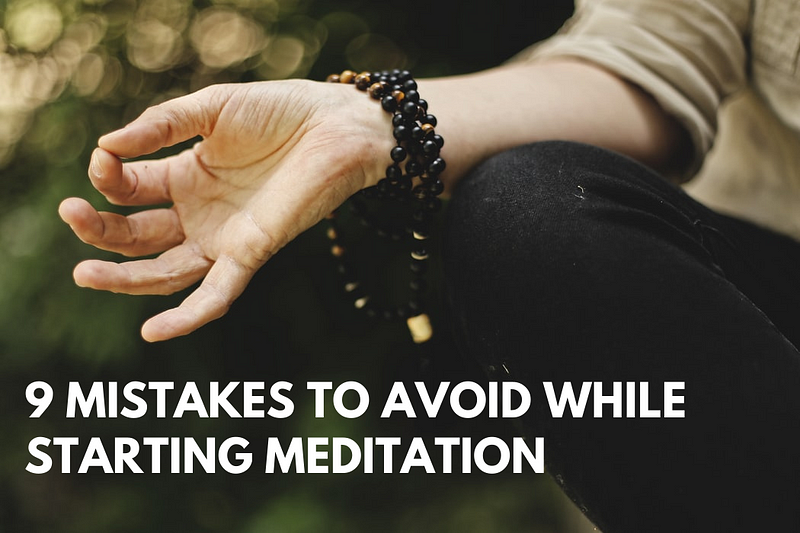9 Mistakes to Avoid While Starting Meditation
Lessons I picked up on the journey of building a meditation habit.

Lessons I picked up on the journey of building a meditation habit.
When I first thought of incorporating a meditation habit into my life, I worried maybe I was aiming too high.
The word “meditation” brought to mind images of a bald monk clothed in crimson robes sitting atop a lonely mountain, lost in another dimension, cut off from the rest of the world.
While I wanted the peace of mind meditation promised, I was skeptical if I’d ever be able to muster up such insane levels of determination.
But now, one year into this journey of meditating every single day, I can safely say it wasn’t as hard as I’d imagined. Sure, it took determination, but nothing compared to the torturous picture I’d painted in my brain.
This post discusses nine mistakes you should avoid if you’re trying to build a meditation habit. Coming from personal experience and backed by science, these tips will help anyone struggling to begin daily meditation.
1. Don’t expect immediate results
Maybe because of the way popular culture has portrayed meditation as the “one-stop solution to get rid of your stress at one go”, many people get frustrated when all their stress doesn’t magically disappear immediately after their first meditation session.
While it’s true that meditation can relieve stress, the results will be seen over time, once you make it a regular habit.
Meditation is more of a spiritual practice to get in touch with your inner self.
The benefits like stress relief and relaxation are its by-products, not its ultimate goal.
2. Embrace distractions
One of the biggest mistakes beginners make while starting with a meditation habit is that they assume they have to be a completely distraction-free environment to get into it. Unless you live in a house all by yourself at the top of a mountain, that’s not possible. There will be background noise no matter when or where you do it.
But, guess what? Distractions are good.
Make them a part of your meditation. Do a sound check and try to be aware of where each sound is coming from. Just listen to all the noise sources. Don’t judge or classify them as “good” or “bad” noise.
This will help you incorporate these distractions into your practice rather than considering them as roadblocks and feeling discouraged.
3. Don’t go into it unprepared
Before starting your practice, take a few minutes to calm your mind and body and reaffirm your intent. This can be as simple as stretching your back, neck, arms, and saying to yourself, “Okay, I’m going to focus now.”
Such small steps go a long way in making sure you don’t lose steam mid-way and can ease into your session.
4. Don’t seek escape in meditation
Meditation is not meant to be a way to suppress your negative thoughts. It’s a guiding light to let you be truly aware of what’s going on in your head and sort through all the emotions.
Don’t consciously try not to think about something negative. Observe all your feelings. Let them grow and naturally dissolve.
5. Don’t aim for long durations in the beginning
Experts might tell you they meditate for two hours every day. But what they don’t tell you is that they’ve been doing it for years now, and have built up the practice over time.
When starting, don’t aim for long durations.
Shorter stretches like 10 minutes can be just as beneficial. In fact, if you’re feeling nervous about that, you can just try taking ten deep breaths in bed. While getting started, even the small steps matter a lot.
6. Don’t keep questioning if you’re doing it right
The truth is, there’s no “right” way to meditate. Different practices work for different people.
So, how do you know if yours is working for you?
If you can keep your attention focused and be mindful of your body, your thoughts, and your surroundings, you know you’re doing great.
7. Don’t keep telling yourself you’ll do it “some time”
If you keep telling yourself you’ll meditate when you find the time, you’ll probably always be too busy or too tired to even give it a try.
While building a new habit, it’s important to consciously allot time for it in your schedule.
Meditation is no different. Just keep a 10-minute slot in your daily routine each day for meditation and see the results for yourself.
8. Don’t be inconsistent
You’re starting something that you’ve never tried before. Don’t be inconsistent as it will be even harder to keep yourself accountable.
Missing a day or two when something major comes up is alright, but missing entire weeks or months in the name of “not finding time” is not.
Marking the days when you successfully managed to meditate on a habit tracker can be a great way to motivate yourself to keep up the streak.
9. Don’t go into it all alone
While it’s possible to start a meditation practice alone, having an accountability partner makes it easier. This can be a friend or colleague with whom you decide to start the new habit together.
Or it can be a certified meditation coach who will guide you through the process and help you on days you feel like you can’t stick through with it on your own.
